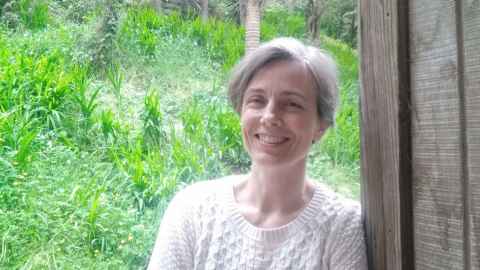Take 10 with... Nike Franke
Dr Nike Franke explains her research into the long-term effects of clinical trials and the importance of engaging better with consumers.

1. Describe your research topic to us in 10 words or less.
My work involves investigating long term effects of perinatal trials on children's development.
2. Now describe it in everyday terms!
I'm part of a research team that investigates how different treatments and medical events influence children's long term development. I have a background in education, so my focus is mainly around outcomes that relate to children's academic functioning. Another part of my research is engaging with research participants to understand what outcomes they are interested in finding out and what their experience is like being part of long-term research. We hope that by doing this we can better engage with them and make it more attractive for people to take part in research.
3. What are some of the day-to-day research activities you carry out?
What I do depends on what stage the research is at, so no one day or week is the same. For example, in the past few months, I've called up prospective participants for interviews, transcribed the interviews, analysed them and discussed them with the wider research team. I wrote up the results in the shape of a paper and presented findings during seminars. I also do a lot of reading, literature reviews, and providing feedback on students’ work. Recently I’ve been doing more quantitatively focused analyses of existing research data.
4. What do you enjoy most about your research?
I really like having contact with others. I've been a lecturer before, but that means standing in front of 40 – 50 students, which I find challenging. I prefer to have a more personal contact with both students and research participants. I also enjoy doing analysis and creating something new and making a difference.
5. Tell us something that has surprised or amused you in the course of your research.
When I conduct interviews with research participants I sometimes ask very personal questions, for example around spirituality or their family belief systems. Once a participant asked me the same question and I suddenly felt what it’s like to be put on the spot. I answered it because I thought that would be fair and by doing so I think we gained a better connection and she participated in a much deeper level afterwards. I'm always surprised that people are willing to open up and to share their stories. I hope I do them justice!
6. How have you approached any challenges you’ve faced in your research?
The first thing that comes to mind is the Covid-19 situation and having to adapt to a more distant type of contact. We had planned to do focus groups with a subsample of participants, but had to change ethics and do everything online or over the phone instead. In a way it was very positive because it gave participants more options. It appears that people really appreciate being able to choose whether they want to meet in person, over the phone, in a group setting, or more individually.
7. What questions have emerged as a result?
I think the challenges of Covid-19 have shown us that people want more options. Moving online has been an enabler because some people prefer to have a quick conversation over the phone, rather than meeting person. From a research perspective it’s not always the best thing because we prefer to have to have the same thing happening to every single participant, but that's just not feasible.
8. What impact is your research having or what impact do you hope it will have?
We hope that by engaging better with consumers - especially with Māori whānau and those in a more disadvantaged position – we’ll give a voice to what they need and what they want through their participation in research. By engaging with a range of participants from a range of backgrounds, we will hopefully address some of the equity issues that exist in some ethnicities as well.
9. If you collaborate across the University, or outside the University, who do you work with and how does it benefit your research?
Working at the Liggins Institute has taught me the benefit of working with people from a range of backgrounds. We collaborate with experts at the University’s Faculty of Arts and Education and the School of Nursing which helps us utilise each other's expertise and have a more all-encompassing approach. If you work together you can share knowledge and do a better job basically.
10. What one piece of advice would you give your younger, less experienced research self?
I wish I had set up more research collaborations, even during my PhD. When you're a student you work alongside people from different backgrounds who end up doing something different. If you can establish those relationships and continue working together throughout your career I think that makes it possible to combine strengths from different perspectives. For example, I'm working with a former PhD colleague at the Faculty of Arts and Education in mathematics. She does everything with regard to mathematics (which I have no clue about!) but I use my analysis skills to help her with her research.